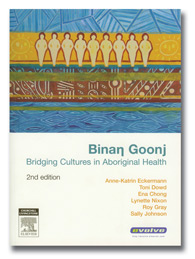
I clearly remember what a strong impression the first edition of Binan Goonj. Bridging cultures in Aboriginal health made on me at the outset of my career in Indigenous health research. This second edition retains much of the balanced and erudite style of the feted first edition. With Binan Goonj meaning hearing but not listening, cross-cultural communication is the raison dêtre of this book.
The text begins with an excellent introduction to the historical and sociopolitical context of Aboriginal health (something notably absent from many other texts in this field). A conversational style blends with challenging questions, activities and case studies to make the book an ideal teaching aid. Poignant narratives of continuing Indigenous disadvantage and marginalisation are accessibly combined with sophisticated social, psychological and anthropological concepts; and an emphasis on cultural adaptability/vitality and Indigenous diversity transcends both anachronistic myths of Aboriginality and the deficit model that continues to trouble public health. The remedies presented in this book focus on comprehensive primary health care, community participation, holism, trust, cultural safety and empowerment.
Although recognising the social determinants of Indigenous health, the book would be better subtitled Bridging cultures in Aboriginal healthcare, as it is primarily aimed at non-Indigenous health care providers rather than professionals in other sectors that have an enormous influence on Indigenous health. The text is also blemished by a smattering of avoidable inaccuracies and careless assertions that may mislead the unfamiliar, and irritate the advanced, reader. These include a definition of scientific racism that encompasses any scientific research undertaken about Indigenous people (p. 9), and the erroneous claim that Aboriginal life expectancy has not improved for generations (p. 65). Overall, this book eschews much of the tired rhetoric of the Aboriginal health arena for an unflinching account of the facts, fallacies and future directions of health for Indigenous Australians.Yin C ParadiesPhD Student, Menzies School of Health Research, NT and University of Melbourne, VIC
- Yin C Paradies




